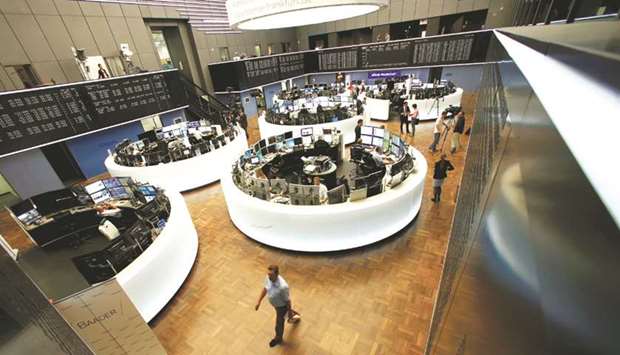Key stock markets were soft yesterday and the dollar faltered as nervousness reigned surrounding China-US trade talks with less than one week until Washington is due to impose fresh tariffs on Chinese goods.
With the December 15 deadline approaching, US President Donald Trump still has not scrapped planned levies on $160bn of Chinese goods, which many fear could derail the long-running talks.
“Given the market has bought into the December tariff delay in a big way, all hell could break loose if the tariffs don’t get postponed,” said Stephen Innes at AxiTrader.
“Indeed, that would be a bitter pill for investors to swallow as the reality sets in that they have yet again been taken down the trade talk garden path only to end up at the cliff edge.”
The London equity market was also hit by official data showing the UK economy flattened in October after contracting the previous two months.
But sterling still climbed to an eight-month high at $1.3190, one day after reaching a 2.5-year peak versus the euro.
The British currency remains well supported going into the final straight of the UK general election Thursday, with Prime Minister Boris Johnson’s Conservatives tipped to win a majority that will help him drive through his Brexit deal.
The euro, meanwhile, got a shot in the arm from a closely-watched gauge of confidence among German financial players — the ZEW barometer — returning to positive territory after months in the red, although fears linger over trade tensions and an industrial slowdown.
Regarding European equities, “the Sunday deadline for further US tariffs on Chinese goods has dragged stock markets lower, with an underwhelming set of UK data, further hindering sentiment”, said Joshua Mahony, senior market analyst at IG trading group.
London’s FTSE 100 closed 0.3% down at 7,213.76 points, Frankfurt’s DAX 30 closed 0.3% lower at 13,070.72 points and
Paris’ CAC 40 closed 0.2% up at 5,848.03 points, while the EURO STOXX 50 was flat at 3,671.78 points at close.
Wall Street was mildly lower in late New York morning trades while European stock markets ended their trading day off the worst levels seen in the morning, with Paris even managing a slight gain.
Major Asian indices had earlier closed little changed.
The consensus is that China and the US will eventually hammer out a partial pact as part of a wider trade agreement, which has fuelled a global equity rally for weeks.
However comments from both sides — optimistic and downbeat — are keeping dealers on their toes.
While the week is full of key events including central bank decisions in the US and Europe, market observers say the trade negotiations are key.
Euro zone government bond yields were mostly steady, refusing to budge from recent ranges.
Germany’s benchmark Bund yield inched up to -0.29%, moving in a three-basis- point-range.
Italian 10-year bond yields, which fell on Monday, were flat on the day at 1.39%.
In the euro zone, Christine Lagarde holds her first meeting and news conference as ECB chief on Thursday.
“Expectations for policy action from the ECB and Fed are subdued,” said Commerzbank rates strategist Rainer Guntermann.” Lagarde’s communication style will be watched closely, but that’s unlikely to lead to any repricing in bond markets.”
Germany’s ZEW research institute said its monthly index on economic morale among investors rose to 10.7 from -2.1 a month earlier, much higher than forecast by economists.
The reading pushed up a market gauge of eurozone inflation expectations to its highest in a month and boosted the euro, which last traded 0.15% higher at $1.1082.
Yesterday, the US two-year yield, a sign of market expectations of Fed fund rates, was at 1.619%, down from its close of 1.627% on Monday.
The 10-year Treasury yield was at 1.8138% from a US close of 1.8225% on Monday.
With investors reluctant to make big bets, MSCI’s broadest index of Asia-Pacific shares outside Japan was 0.25% lower.
China’s benchmark Shanghai Composite index was higher by 0.1%. New data in China showed producer prices fell in November but consumer prices spiked, complicating efforts to boost demand as economic growth slows.
Australian shares were down 0.34%. Japan’s Nikkei fell 0.08%.Tepid trade followed weakness on Wall Street overnight.
The Dow Jones Industrial Average fell 0.38% to 27,909.6, the S&P 500 lost 0.32% to 3,135.96 and the Nasdaq Composite dropped 0.4% to 8,621.83.
Investors were also keeping an eye on the US Federal Reserve.
The Fed is expected to leave rates unchanged at its two-day policy meeting, which ends Wednesday.
Analysts say investors will be watching policymakers’ forecasts for future US economic growth.
Investors have focused this year on the risks of the UK crashing out of the European Union without a deal and a sharp escalation in trade war tensions, said Frank Benzimra, head of equity strategy at Societe Generale.
“What you have seen since the end of the third quarter and the beginning of the fourth quarter was these two risks were receding... And now this week you see those two concerns coming back on the market,” he said, adding that he expected their effect would be short-term.
The dollar index, which tracks the US currency against a basket of six other major currencies, was down 0.14% at 97.506.
Worries over trade continued to push oil prices lower.
Data released on Sunday showed that Chinese exports declined for a fourth straight month, underscoring the impact of the trade war between the US and China, which is in its 17th month.
Global benchmark Brent crude fell 0.54% to $63.90 a barrel and US West Texas Intermediate crude dipped 0.54% to $58.7 a barrel.
Gold rose 0.4% to $1,467.31 per ounce.

Traders work in front of the DAX board at the Frankfurt Stock Exchange. The DAX 30 closed 0.3% lower at 13,070.72 points yesterday.
